Another Not Scotland
By Alasdair Gray
We have commissioned a new piece of writing from fifty leading authors on the theme of 'Elsewhere' - read on for Alasdair Gray's contribution.
Nobody is more like God than a baby. Babies live in eternity, a present tense without past, future and thought. When hungry or in pain their whole universe starves and is wholly evil until it supplies what they need, failing which they abolish it by dying. When fed, comfortable and awake they are fascinated observers of sensations, smells, tastes, noises, lights and colours. Slowly they start noticing other bodies besides their own.
As a baby I was taken out in a pram by my mother’s sister, Aunt Annie, through Riddrie Knowes near my home. The Knowes had an unpaved road between big elm and beech trees, and one day (she told me years later) a crow fell into the pram from an overhead branch, perhaps struck dead by heart failure. This unexpected corpse did not hurt me, but when we passed under that tree on a later perambulation I looked up as if expecting another bird to fall from it. I was obviously starting to associate ideas, as Hobbes, Locke and Hume called the process. More experience of the tree maybe taught me it was not a dependable source of dead birds. Before my son could walk or talk I saw him too start connecting past and future. When fed his first spoonful of ice cream he frowned – What is this? – then looked shocked – It freezes! Hurts! His face tensed, mouth opened as he drew a deep breath to bellow his rage out, but stopped before the cry emerged. His mouth was thawing the freezing cream, the pain of his cold palate giving way to a wonderful new sweetness on his tongue. He swallowed, licked his lips, opened his mouth for more. The second spoonful made the first range of expressions happen again, but faster. When all the ice cream had been eaten he was welcoming the chill as herald of something good. He was learning to remember, anticipate and think.
Wordsworth is surely right to say natural things like rainbows, sunlight, storms, flowers, etcetera appear more wonderful in our youth. So what causes our early appetite for tales of magic gifts, impossible monsters, fantastic kingdoms? I seem to remember that no sooner was home a familiar place to me than I wanted stories about extravagantly different places. In the 18th and 19th centuries some authors decided that respectable people’s children were having their minds filled with unrealistic nonsense by superstitious nursemaids. They wrote tales for children about children in a world superficially like their own, where children who lied or stole came to bad ends, and good children sometimes suffered unfairly, but were at last rewarded or died and went to Heaven. The sensible Christian poet Sam Johnson and scatterbrained Romantic poet Sam Coleridge both hated such change. They agreed that young children needed tales of giants and magical wonders, “to stretch their little minds” said Johnson. Infants live in a world of giants where even those only a year or two older tower over them. They can hardly ever redress unfair treatment so of course like imagining help from fairy godmothers, a Wizard of Oz, a magic lamp or tinderbox. As a child in the 1930s and 40s I gloried in such stories and the Disney movies based on them, which wisely contained believable nightmares – the wicked witch’s gloating mockery of the skeletal prisoner dead from thirst, Dumbo Jumbo’s mother chained up as a mad elephant when she revolts against her child being made a clown, Pinocchio growing donkey ears and tail after an orgy of vandalism. My appetite for such fantasies was healthily abated between the years of eight and ten when I lived at the edge of a Yorkshire market town.
Our home was a bungalow at the side of a rural lane. On the other side was a neglected field with trees and clumps of bushes, also an overgrown garden with a draw-well smothered in ivy. I recall no sign of a house, not even a ruined one. Here with one or two school friends I made what we called dens – secret places in the middle of bushes or up trees which we wanted nobody else to know about or discover. A lot of good, open-air exercise was got by trying to make these, and exploring the banks of the river Wharfe in search of others. I remember nothing remarkable happening in these dens, not even stories we told each other there, but in 1944 my return to the Glasgow housing scheme where I had been born felt like a confinement. Dens could not be built in Riddrie Knowes or our public park. Other Glasgow boys of my age played outdoors by kicking balls about. I did not enjoy that. Stories about fantastic lands became my obsession. I visited Riddrie Public Library four or five times a week, never taking much more than a day to finish a book.
The genre I preferred always began with someone who seemed, like me, in a world regarded as commonplace, and then found an exit into a place of magic adventures. The earliest classics of this kind were Lewis Carroll’s Alicebooks, with others I read or heard dramatised on the BBC’s Children’s Hour – The Magic Bed-Knob, The Wind in the Willows,The Box of Delights. A subdivision of this genre had children who discovered lost or hidden lands when on holiday. Enid Blyton wrote a shelf of books about children finding mysterious geographies – The Valley of Adventure,Seaof Adventure,Castleof Adventure,Islandof Adventure, etcetera. Growing older I found similar books had been written for adults – Conan Doyle’s The Lost World,Rider Haggard’s She, The Return of She and Allan Quatermain.There were films about them – King Kong and Lost Horizon. In a BBC radio dramatisation I heard H.G. Wells’ The War of the Worlds and at once ordered through Glasgow Public Libraries all his early romances, which I still think are science fiction’s unsurpassable best. His The First Men in the Moon took me to an impossible moon, yet imagined with such inventive detail that humanity is shown in a new light. That novel, The Time Machine and The War of the Worlds describe exotic worlds elsewhere, but are no more escapist fiction than Gulliver’s Travels and Orwell’s 1984.
Before leaving secondary school I decided to write a book about a world of my own invention that would also satirise the world I knew. When planning it I was inspired by Kafka’s The Trial, with Edwin and Willa Muir’s foreword saying that Kafka’s protagonist was seeking salvation like John Bunyan’s Pilgrim, but in a world where neither Heaven nor Hell are signposted. In Kafka’s world the agents of an obscure but inescapable bureaucracy hound a man in his rented bedroom, in the attic of a slum tenement, in the cupboard of a bank where he works and in a cathedral outside service time – encounters that I felt could happen in Glasgow.Kafka’s bureaucrats were more humane and believable than Orwell’s Thought Police, and his hero was so ruthlessly selfish that I never doubted his guilt. I was also reading books about the growing pains of men in other cities nearer my own in time and space – David Copperfield, A Portrait of the Artist as a Young Man, Sons and Lovers. I now saw that books which (Milton says) the world would not willingly let die, must contain real local experiences such as those Dickens, Joyce and D.H. Lawrence suffered, even if they combined with Heavens, Hells and Wonderlands elsewhere. Most books in the Bible did that, most folk tales and the Scottish Border Ballads. In a public library (Denistoun, not Riddrie) I found Tillyard’s The English Epic and Its Background which, after briefly surveying the great epic poems and histories of Greece, Rome, Italy and Portugal, concluded that since Milton’s time, great epics were likely to be written in prose. He said that Walter Scott’s best novels almost (though not quite) amounted to a Scottish national epic. So that was what I set out to write.
My Scottish primary and secondary schooling had said hardly anything about Scottish culture. Our state schools before the 1970s had generally better standards than their English equivalents, but aimed to qualify the smartest pupils for high positions in England, Canada, Australia and elsewhere, so in Scotland English literature was taught as if no Scot had contributed to it. We knew of Robert Burns because many of our parents admired his poems which were also sung on the BBC Scottish Home Service, but R.L. Stevenson was dismissed as a writer for the very young, and the only Scott novel given to us was Ivanhoe. This tells how the Normans in England became acceptable to the conquered Saxons – a fine lesson for
Scottish children! For most of the 20th century Hugh MacDiarmid was ignored as a poet by British academics and dismissed as a pest by Scottish politicians, though professors of literature in Europe and the USA paid attention to his work. In 1958, The Private Memoirs and Confessions of a Justified Sinner by James Hogg was reprinted with a preface by Andre Gide. It came to Glasgow Public Libraries and me, proving that Scottish local and supernatural events could combine in prose as well as poetry. But to work well in a book, the Scottishness of Scottish characters must be taken for granted. Dostoyevsky slightly spoils some great novels with sentences about Russian-ness. Gillespie by MacDougall Hay is a nearly great novel. It describes a dull but cunning, mean, greedy grocer becoming wealthy in a Highland fishing village, blighting lives around him as he does so, yet his insensitivity is almost heroic in its scale and effects. This account of 19th century capitalism transforming a small town would be almost as good as Hardy’s The Mayor of Casterbridge and Brown’s The House with the Green Shutters,had it not an impossible first chapter indicating that the weird, uncanny Scottish setting had doomed Gillespie’s parents to produce a monster. I saw that the local setting of my epic, like the supernatural parts, must be shown without comment in small convincing details.
I was 44 in 1979 when this novel was completed and accepted by an Edinburgh publishing house. I did not foresee it would be a successful book and two years would pass before it was printed, but I knew that shelves in a warehouse and shops would soon hold well-bound, hardbacked copies of Lanark, each 560 pages and each almost as solid as a brick. This gave me a strange but pleasant feeling that my soul – my inner being – was now safe outside myself and could outlast my body. This safe feeling was helped by a new job that, in return for a little agreeable work, gave me a steady wage and an office with a view across Kelvingrove Park. I was writer in residence at Glasgow University, discussing the writings of a few students who wanted my advice, but the job did not require me to write anything. Nor did I wish to write. I had no ideas for other stories, had no intention of seeking them. I decided to enjoy reading for its own sake as I had done as a child. No longer interested in escapist fantasies, I bought Ezra Pound’s complete Cantos. I had gathered that they were great poetry about the good and bad monetary roots of our civilisation, something we should all understand. Democracy is impossible if only economists and a few politicians understand it, as seemed to be the case in Britain. The Glasgow of my youth had been the most industrially productive part of Scotland, making and furnishing locomotive trains, ocean liners and war ships, most of the latter ordered by the British Government. Despite local protests, Glasgow was steadily losing all its industries while the British government spent more and more of our money on nuclear submarines based in the Holy Loch, again despite local protests. With the Cantos I also bought The Road to Xanadu by Livingston Lowes, a study of how Coleridge had come to write his greatest poems. I was interested in how the minds of poets work.
Alas, I found Pound’s Cantos impenetrable, apart from his verses saying how good craftsmanship was blighted by the extortionate money lending which Marx called Capitalism. His quotations from Chinese and Renaissance scholars and founders of the USA republic, and references to Mussolini’s public work schemes, produced in my mind nothing but a formless, confusing fog. But suddenly one line from his Chinese Cantos spoke to me clearly:
Moping around the Emperor’s court, waiting for the order-to-write.
The last three words were hyphenated because they were obvious translations of a single Chinese character. I imagined a highly hierarchic empire training a man from infancy to be a great poet, flattering him with high rank and privileges, yet not letting him write a word before it ordered a great poem from him. A comic idea! I lifted a pen and wrote this –
Dear mother, dear father, I like the new palace. It is all squares like a chessboard. The red squares are buildings, the white squares are gardens…
– and started inventing another world elsewhere. Livingston Lowes’ book had stimulated this by listing the exotic domains than had inspired Coleridge: a source of the Nile, a Himalayan grotto, the happy valley where Abyssinian kings kept their heirs, the artificial paradise in the Atlas Mountains where assassins were trained. This revived in my middle-age the pleasures of childhood den-making and the lost worlds that had long ago entertained me in books, comics and films. Loading my poet with madly luxurious apartments, gardens and servants, I invented the cruel education that had qualified him for these privileges, and later revealed the huge confidence trick through which the vast, exploitive empire was ruled, since the Emperor turns out to be a puppet managed by ventriloquists.I finally thought of the order-to-write – a poem praising the government’s worst atrocity, the destruction of the city in which the poet had been born. Five Letters from an Eastern Empire is certainly my best short story.
After publication in 1983 the head of Talks in Scottish BBC Radio decided to broadcast it, and met me to discuss this. He was a pleasant man called Golding, who told me he had been placed in Glasgow with others from London to manage Scottish broadcasts in 1977, when a national referendum nearly gave Scotland a devolved parliament. When the Scottish majority in favour of this was judged too small by Westminster, Mr Golding had decided to continue living here. He asked if there was an actor I would like to read my story. “Bill Paterson,” I said. “But surely Bill Paterson has a Scottish voice?” said Mr Golding. I replied that Bill Paterson had indeed a Scottish voice, but there were many Scottish accents, both working class and posh. My poet was a mandarin with working-class parents; Scotland had many such mandarins in its universities, and Bill Paterson could easily sound like one. “But your narrator is supposed to be the Poet Laureate of a great empire!” said Golding, who obviously thought the loss of the British Empire irrelevant. He had the story recorded in London by an English actor and broadcast throughout the United Kingdom.
That broadcast won the approval of Roger Scruton, a Conservative critic who thought the story a satire on Communism. A friend who later attended an international literary conference told me he had heard a Chinese and Japanese scholar discuss which of their nations my empire most resembled. I told him that, in my opinion, it most resembled Britain.
Copyright © 2010, Alasdair Gray. All rights reserved.
Supported through the Scottish Government’s Edinburgh Festivals Expo Fund.

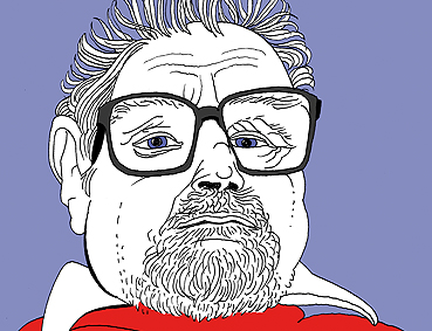
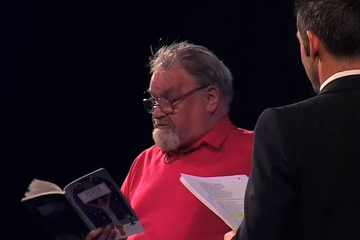
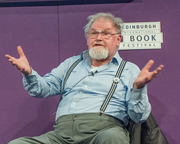
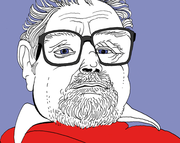
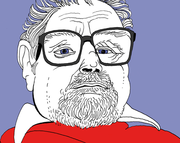
 Major new partnership with Celtic Connections
Major new partnership with Celtic Connections 

